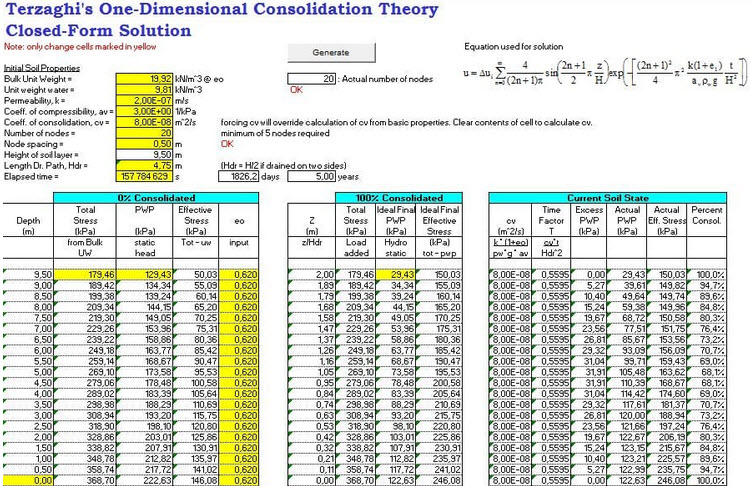Terzaghi's Consolidation Equation - Closed Form Solution
Terzaghi’s one-dimensional consolidation equation simulates the visco-elastic behaviour of soils depending on the
loads applied as it happens, for example, when foundation are laid and start carrying the weight of the structure.
Its application is traditionally based on Taylor's solution that approximates experimental results by introducing non-
theoretical variables that, however, contradict the actual behaviou of soils. After careful examination of the theoretical
and experimental aspects connected with consolidation, the proposal of this research is a solution consisting in a non-
linear equation that can be considered correct as it meets both mathematical and experimental requirements
The solution proposed is extended to include differential equations relating to two/three dimensional consolidation by
adopting a transversally isotropic model more consistent with the inner structure of soils.
Finally, this essay is complete with application examples that give more reliable results than the traditional solution.
Future developments are also highlighted considering that the uniqueness theorem has not been proven yet

Terzaghi’s one-dimensional consolidation equation simulates the visco-elastic behaviour of soils depending on the
loads applied as it happens, for example, when foundation are laid and start carrying the weight of the structure.
Its application is traditionally based on Taylor's solution that approximates experimental results by introducing non-
theoretical variables that, however, contradict the actual behaviou of soils. After careful examination of the theoretical
and experimental aspects connected with consolidation, the proposal of this research is a solution consisting in a non-
linear equation that can be considered correct as it meets both mathematical and experimental requirements
The solution proposed is extended to include differential equations relating to two/three dimensional consolidation by
adopting a transversally isotropic model more consistent with the inner structure of soils.
Finally, this essay is complete with application examples that give more reliable results than the traditional solution.
Future developments are also highlighted considering that the uniqueness theorem has not been proven yet

